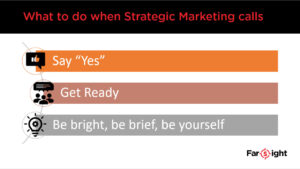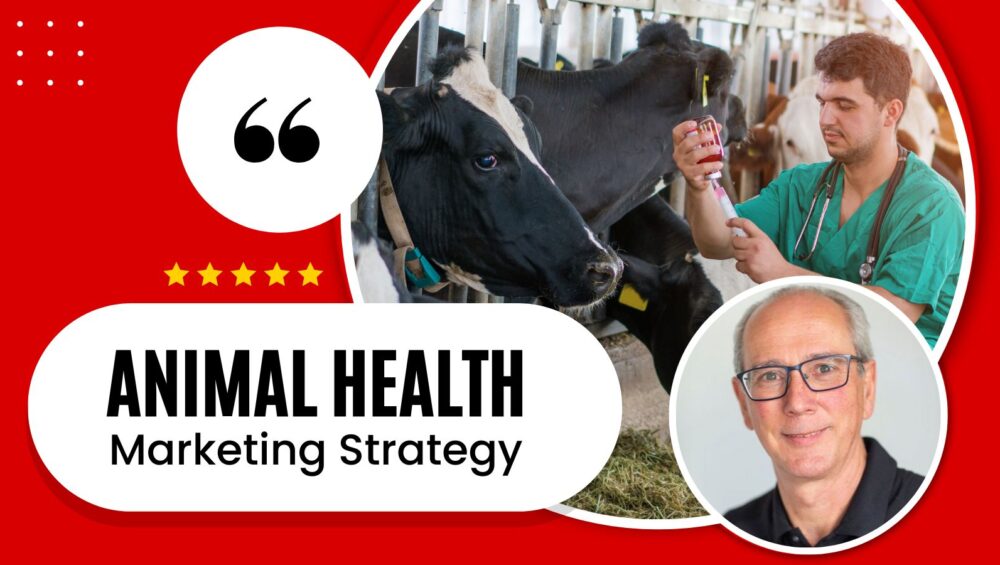Animal Health Marketing Strategy: When Strategic Marketing Calls
The Call
Whether you work in sales, technical services, R&D, regulatory affairs, operations, or any other function in the Animal Health & Nutrition sector, at some point you’re likely to be involved in one or more strategic marketing tasks. That’s a good thing and a sign that AHN companies understand that they need to seek input from the best professionals from all areas of their organizations to create sound strategies.
At the same time, it’s quite common for professionals in technical or scientific positions to feel a little bit lost when they are asked to join a strategy-building effort. After all, AHN companies recruit most of their talent from a pool of technical and scientific backgrounds, such as animal scientists, nutritionists, and veterinarians. While those professionals bring a wealth of knowledge and expertise to the industry, they are typically not trained in business planning, marketing, or strategy in general.
How I Answered the Call
I should know because that was exactly my experience. I trained as a veterinarian, and before joining my first Animal Health company, I worked as staff veterinarian for two poultry integrators for three years. Soon after starting my career as a technical services advisor for a gigantic multinational pharmaceutical company, I was pulled into various tasks that were not part of my educational background, such as new product development, discussions about market segmentation, preparations for launching new products, creating sales training materials, messaging, value calculations, and much more, all without much or any understanding of the business side of those tasks.
My natural instinct was to fall back and rely pretty heavily on what I was taught on veterinary school and my experience as a practicing veterinarian in charge of broiler health for my previous employers. It took me a while to learn how to think less as a veterinarian and more as a marketer. It took even longer to learn how to think strategically, and even to understand what strategy really means.
Why You Should Answer the Call
Throughout the industry, the same pattern repeats itself. How many sales, marketing, operations, and business leaders of today started their career with a scientific background and little or no training on business? Obviously, their scientific training gave them important advantages that are sought after by the AHN industry. Many successful industry leaders earned their stripes working in food animal production or in veterinary clinics and that experience of being “on the other side of the table” is incredibly valuable to AHN companies. Some of them may also bring their natural business acumen or experience as entrepreneurs, but it is safe to say that most professionals with a technical background don’t have previous experience in sales, marketing, or strategy when they are first exposed to this side of the business.
The good news is that many technical/scientific professionals have a pretty good feeling about how the market is divided into segments, who their ideal customer is, what they value, and the best way to deliver that value to them. These are the most critical elements of any strategic initiative and something that comes naturally for those professionals. Scientists with different backgrounds, such as microbiologists and chemists, may not have the same instinctual grasp of the market, but they can provide valuable insights into other strategic areas, such as product development, operational efficiency, project planning, technological advancements, and much more.
How Do You Market Animal Products?
1. Say “Yes”
Even if you didn’t sign up to create your company’s strategy, when the opportunity arises, you should take it. Remember, your marketing colleague or whoever else is spearheading the strategic marketing initiative needs the technical expertise and deep understanding of the customer’s problems that you have. Without the technical or scientific input, the strategy will likely become more vague, generic, and less effective. Only the technical/scientific input can make the strategy uniquely adapted to the realities of the marketplace with all its complexities.
2. Get Ready
The best way you can prepare for a strategic marketing workshop or planning session is to adopt a “customer point of view” of your company or product line. Most likely, your marketing colleagues asked your help exactly because you understand how customers think and act better than anyone else in the company. In the Animal Health & Nutrition sector, similar to many other B2B industries, customers select suppliers and products based on technical specifications set up by veterinarians and nutritionists in their staff or who provide consulting services for them. Those same veterinarians and nutritionists will later on be accountable for the results obtained, the performance improvement achieved, or the intervention outcomes.
For this reason, the job you are called to perform in a strategic marketing session is, more often than not, of bringing the voice of the customer to the table. The closer you are to end-user customers and their technical advisors (veterinarians and nutritionists, in the case of Animal Health & Nutrition companies), the more authentic and fresh you will be delivering the “voice of the customer.” Not only you will bring valuable insights about your customer’s jobs, pains, and gains, you probably also have a deep understanding of your competitors, their strengths and weaknesses, as well as the threats and opportunities most relevant to your company or brand.
3. Be Bright, Be Brief, Be Yourself
When the time comes to show up for the strategic marketing session, one important thing to keep in mind is that you’re not going to a scientific conference. Your knowledge and experience with the customer’s problems, the competitive products, and your own brand’s features and benefits are extremely valuable, but the strategic marketing session is not the best forum to have lengthy and in-depth dissertations about the minutiae. Rather, the situation calls for brevity, clarity, and simplicity when technical aspects are discussed . Many a strategic meeting has been derailed by convoluted technical arguments and academic discussions that didn’t add much value to the strategic direction being designed.
While some technical experts may be proud of their scientific acumen, their expertise will be best utilized in a strategic marketing session if it is used to illuminate underlying customer problems, unmet needs, long-standing customer frustrations, and unmitigated pains. Leave the scientific details for the next professional conference, and help your marketing colleagues get your point without the need to achieve a PhD level of understanding.

In summary
The deficit in formal training in business and marketing comes into sharp relief when technically or scientifically trained colleagues are invited or “volunteered” to participate in strategic marketing activities. Some of us learn and enjoy that different type of challenge. Others hate it and have a hard time grasping why the company spends so much time and money tossing around buzzwords about “customer centricity”, “jobs to be done”, “vision and mission”, and others like those.
Even though not every DVM or animal science PhD will learn to appreciate the value of a well-crafted positioning statement, and may scoff at workshops that aim to define the essence and voice of a brand, we should all open our minds and understand that those elements of strategic marketing are as essential to the success of an Animal Health and Nutrition company as the intricacies of the mode of action of a novel molecule, the upregulation of immune response, or the performance response of an animal to a given treatment.
If you want more advice on how to bring technical expertise to bear on strategic marketing initiatives, contact us .
If you want to learn more, continue exploring our website . FarSight Consulting constantly adds new resources to help you transform your marketing into an incredible sales growth machine.

